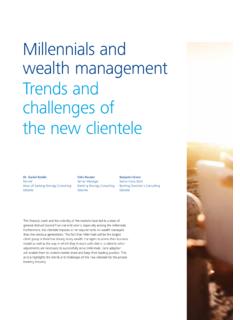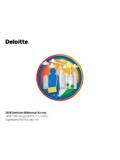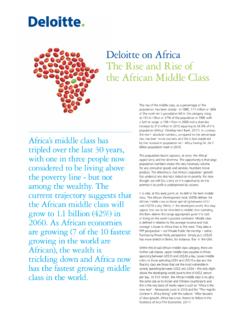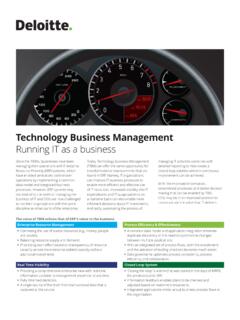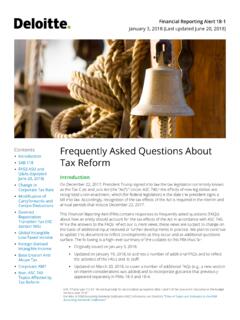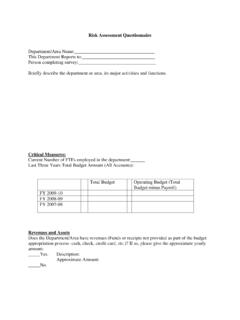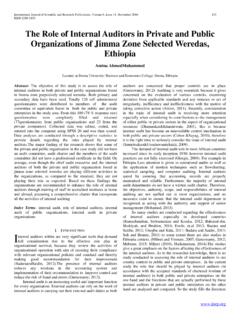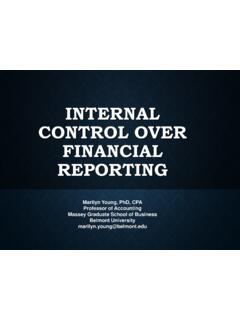Transcription of Audit Committee Resource Guide - Deloitte
1 Audit Committee Resource GuideReferencesThe King IV Report on Corporate Governance for South Africa 2016 (King IV)Companies Act 71 of 2008 Johannesburg Stock Exchange Listings RequirementsThe SAICA Guide to the Companies ActFinancial Reporting Council (UK) Guidance on Audit Committees01 Audit Committee Resource Guide | ContentsContents Section 1 Audit Committee leading practices and trends _____ 03 Section 2 Audit Committee composition _____ 09 Appointment of the Audit Committee _____ 09 Independence of Audit Committee members _____ 11 Qualifications and financial literacy _____ 15 Director qualification disclosure requirements _____ 17 Section 3 Key responsibilities _____ 19 Audit Committee charter and agenda _____ 19 functions of the Audit Committee _____ 20 Reporting and disclosure _____ 22 Non- Audit services _____ 24 Appointment of the externl auditor _____ 25 Assessment of the independence of the external auditor _____ 26 Assessment of the finance
2 Function _____ 30 Interaction with management _____ 32 Oversight of the internal financial controls _____ 32 Interaction with the internal auditors _____ 33 Risk assessment and oversight _____ 36 Combined assurance _____ 37 Fraud and internal control over financial reporting _____ 39 Complaint hotline procedures _____ 41 Section 4 Interaction with the external auditor _____ 45 Communication between the Audit Committee and the external auditor _____ 46 Appointment of the external auditor _____ 50 Auditor independence _____ 51 Auditor rotation _____ 55 Quality of the Audit _____ 55 Evaluation of the external auditor _____ 56 Section 5 Education and evaluation _____ 56 Board education _____ 59 Audit Committee performance evaluation _____ 63 AppendicesAppendix A Sample Audit Committee charter _____ 65 Appendix B Planning tool: Audit Committee calendar of activities _____ 81 Appendix C Audit Committee performance evaluation _____101 SECTION 1 Audit Committee leading practices and trendsAudit Committee leading practices and trendsThe following is a summary of certain leading practices for Audit committees.
3 It is not all inclusive, but it can be used to help assess Audit Committee practices and to discuss agendas and other dynamics Focus on Committee composition, including independence, financial expertise, risk management, broad business or leadership experience, and succession planning Limit the number of Audit Committee members to four or five to optimise effectiveness Conduct an annual Committee self-evaluation Consider periodically rotating Audit Committee members, including the chairman Encourage discussion, rather than presentation, at meetings Participate in Audit Committee education activities Engage independent advisers when needed Meet at least quarterly, or more frequently as circumstances dictate Maintain appropriate coordination between the Audit Committee and other board Committee Resource Guide | Audit committe leading practice and trends03 SECTION 1 Audit Committee leading practices and trends04 Audit Committee Resource Guide | Audit committe leading practice and trendsSelf-assessment and evaluation of effectiveness Review and approve the Audit Committee charter and align activities with a calendar that incorporates required activities and allows flexibility for additional topics Develop meeting agendas in consultation with management.
4 Resist the urge to repurpose existing agendas without discussion Align Audit Committee meeting materials and agendas with priority areas Distribute briefings and other materials well in advance of meetings Reports should include executive summaries that highlight issues and critical discussion points to allow for discussion versus presentation during meetings Manage meeting attendees to allow open and candid discussions Perform a robust self-assessment annually Discuss the results of the self-assessment with the Audit Committee in an executive session and develop tactical actions to address of internal controls, financial reporting and integrated reporting Understand key controls and reporting risk areas as assessed by financial management, the internal auditors, and the external auditor Emphasise oversight of corporate taxes, an area where high-risk and big-money decisions are made Leverage the value of internal controls beyond compliance Consider levels of authority and responsibility in key areas, including pricing and contracts, acceptance of risk, commitments, and expenditures Understand complex accounting and reporting areas and how management addresses them Understand significant judgements and estimates used by management andtheir impact on the financial statements.
5 Such as fair-value accounting and related assumptions Anticipate and understand how regulatory developments and reporting developments in the areas of financial, sustainability reporting and integrated reporting may affect the company, particularly its talent oversight Focus on financial risks, fraud risk and other risks that may affect the integrity of external reports Increase the focus on risk oversight and assessment Avoid becoming overly dependent on forms or tools for monitoring risk Periodically reassess the list of top risks, determining who in management and which board Committee is responsible for each Evaluate information technology (IT) projects (with a focus on financial reporting), including IT milestones and reporting against them, especially for IT transformation Have appropriate leaders in the business make a presentation at a board or Audit Committee meeting to enhance the members' understanding of the business and risks and to evaluate the depth of talent with the external auditor Exercise ownership of the relationship with the external auditor Get to know the lead partners and meet periodically with specialists (such as tax, IT, actuarial, regulatory)
6 Establish expectations regarding the nature and method of communication, as well as the exchange of insights Engage in regular dialogue outside the scheduled meetings Set an annual agenda with the external auditor Focus on the external auditor s qualifications, performance, independence, and compensation, including a preapproval process for Audit and non- Audit services Provide formal evaluations and regular with the CFO and other management Focus on the tone at the top, culture, ethics, and hotline monitoring Conduct annual evaluations of the CFO Engage in the identification of potential issues Understand plans to address new accounting and regulatory reporting requirements Provide input to management s goal-setting process Discuss succession planning for the CFO and staff Conduct pipeline and staff reviews, including identification of high-potential Committee Resource Guide | Audit committe leading practice and trendsExecutive (private)
7 Sessions Audit Committee meetings should be preceded or followed by private sessions with the CFO, the internal auditors, and the external auditor Use an executive session for Committee members to discuss how the meeting went and to identify agenda topics for future meetings Discuss succession plans for the finance organisation with the CEO and CFO annually during a private session Establish expectations as to what sort of topics and discussions are expected of the external auditor in private compensation Coordinate with the remuneration Committee on incentive compensation goals Work with the remuneration Committee to understand the implications of the incentive structure, including its impact on employee retention and potential increases in fraud risk Increase focus on the compensation of officers and directors, including the appropriate use of corporate with the internal auditors Ensure that the internal auditors have direct access to the Audit Committee Consider having internal Audit report directly to the Audit Committee and administratively to senior management Play an active role in determining the highest and best use of internal Audit , as well as the appropriate structure of the group (such as in-house versus outsourced resources)
8 Be involved with the internal Audit risk assessment and Audit plans, including activities and objectives regarding internal control over financial reporting Conduct annual evaluations of the chief Audit executive Understand internal Audit staffing, funding, and succession planning, particularly the adequacy of resources; consider performing peer benchmarking to compare relevant and continuing education Address board education in the company s corporate governance guidelines to be consistent with JSE listing requirements Provide orientation of new members that involves company executives, internal Audit , and the external auditor Include educational topics on the agenda 1-2 times per year; topics may include a deep dive on a specific area of the business and related risks, or a refresher on a significant accounting estimate Consider offering annual continuing education opportunities in financial reporting and other areas relevant to the Audit Committee ( specialised or regulated industry matters, new regulations, operations, and emerging topics such as cybersecurity).
9 Audit Committee compositionSECTION 2 Audit Committee compositionAudit Committee Resource Guide | Audit Committee compositionThe King IV Report on Corporate Governance for South Africa 2016 (King IV) emphasises the vital role of an Audit Committee in ensuring the effectiveness of the organisation s assurance functions and services, with particular focus on combined assurance arrangements, including external assurance service providers, internal Audit and the finance function, and the integrity of the annual financial statements and other external reports issued by the organisation. The key role of the Audit Committee is echoed in the Companies Act, 2008 (Act No 71 of 2008) (the Companies Act or the Act) and the JSE Listings of the Audit committeeThe Companies Act requires public companies and state owned companies to appoint an Audit Committee .
10 In addition, any other type of company (private company, personal liability company or non-profit company) that provides for the appointment of an Audit Committee in their Memorandum of Incorporation must comply with the relevant provisions of the Act to the extent provided for in the Memorandum of Incorporation . In our experience, very few private companies choose to include a requirement in its Memorandum of Incorporation for the appointment of an Audit Committee . Notwithstanding the requirements of the Companies Act, King IV proposes that ALL companies should have an Audit Committee . In terms of the JSE Listings Requirements the appointment of the Committee

